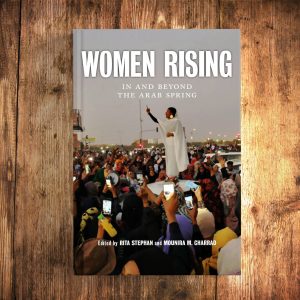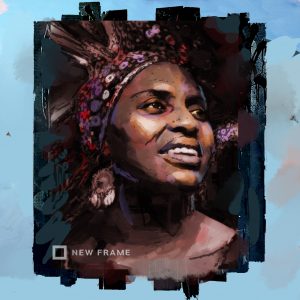Kashmir’s creative feminist insurrection
An anonymous collective of young Kashmiri women is leading an artistic rebellion that is raising its voice against India’s occupation and challenging society’s patriarchal norms.
Author:
27 August 2020

This rendition, crooned like a benediction, perfectly epitomises Kashmir’s yearning for freedom and its ongoing resistance movement. The song is themed on a duaekhaer (prayer) made by a Kashmiri grandmother, who at the end of this poetic creation makes a ritualistic exhortation for the disputed valley’s peace, an end to military occupation and freedom for her qoum (nation).
Called Duaekhaer-e-Inquilaab (Prayers for Revolution), it is a “radical feminist expression of resistance” against the Indian military occupation. This is how Zanaan Wanaan, an anonymous collective of young Kashmiri women in their early 20s, defines its artistic creation. Zanaan Wanaan is made of two Kashmiri words, which literally translate to “women speak”. The unknown poets are being revered for their powerful renditions that call for revolution and resistance against the military occupation.
Oh my God! take out the Indian guns,
bestow Kashmir its freedom.
Make our valley peaceful,
and force out the military.
Grant freedom to those youth that are in jails!
and chase the military out of this place.
grant Kashmir its freedom!
grant Kashmir its freedom!
The song culminates with these lines, which are spoken in an oracular-like fashion by one of the woman’s grandmothers. In her mild rustic voice, she prays for Kashmir’s freedom and justice for the Kashmiri community. The centrality of bouba, as a grandmother is often called in the colloquial language, becomes imperative in this act as she has been a “witness” to the many repeated betrayals by the Indian state, and also owing to her existence as “a testimony of resistance” of the Kashmiri women against the state’s patriarchal authoritarianism.
“A duaekhaer becomes an act in which the state can wrest no control or power. It is a kind of space where Kashmiri own every part of it. Whatever you wish for, whoever you want to wish for, however you want to wish, however long you want to wish for, everything in this act is in your control,” says one of the women associated with the collective, who wishes to remain unidentified. The prayer by bouba as part of the rendition, the collective underlines, thus becomes symbolic as an act of reclaiming power and control over Kashmiri women’s bodies, which otherwise have been systematically disenfranchised by the Indian state.
“This is also crucial in physiological terms, more so for our generation that has been brought up hating our own culture. We have been kept away from our identity systematically. At schools, for instance, we don’t get to read our own history or discuss what is happening in the valley,” says the artist.
Marking a dark year
The song was released exactly a year after Prime Minister Narendra Modi’s right-wing government scrapped Article 370 of the Indian Constitution, which had guaranteed Kashmir some degree of autonomy and forbidden Indians from settling in the disputed Himalayan territory. For the collective, though, the song was not designed to address the issue of the change in Kashmir’s legal status with the dominion of India.
“A lot of people were calling it ‘Black Day’. However, we were careful of not making everything about the abrogation of Article 370, because what we are producing is not just driven by last year’s happenings but by what has occurred for a long time,” she emphasises. The reason for releasing it on 5 August is primarily “symbolic” of the intensified suppression endured by Kashmiris for the past year.
Related article:
For the group, which could easily be Kashmir’s female Banksy, the song is “very personal as well as political”, especially given that there is little distinction between the two in the context of the ongoing conflict in the region and suspension of people’s rights and liberties. The everyday prayer, says the artist, starts with an immediate wish for a child, family member or relative, but then it gradually extends these wishes for all Kashmiris and the rest of humanity.
“It was fascinating to see how the duaekhaer is both an individual as well as a collective action, starting with a call for bestowing blessing to immediate relatives and then for the entire community. It is quite symbolic because it encompasses everyone.”
The burden of military might
Kashmir remains one of the most heavily militarised zones in the world. It is also the site of one of the oldest land disputes in South Asia since the division of the Indian subcontinent. Delhi launched a massive military operation, which left 100 000 Kashmiris dead, in the wake of the eruption of a popular armed movement in the late 1980s. State authorities have regularly imposed harsh lockdowns in this restive state to bar people from taking to the streets to protest against India’s rule, or hold any public demonstrations.
Because of this, there have been periods where the entire state has been locked down for months, with the military imposing stringent undeclared curfews that restrict any public movement. In the past year, Kashmiris have been largely confined to their homes owing to the military lockdown imposed by India’s Hindu-nationalist government in the wake of the political turmoil, and also because of the Covid-19 pandemic.
Related article:
Zanaan Wanaan says the reason bouba remains the central figure of its song is because of the amount of time youngsters in Kashmir get to spend with their elderly relatives during periods of lockdown. “It is really fascinating that despite all that Kashmiris have been subjected to, our elderly women continue to stay dedicated [to the resistance movement], wishing and hoping for better things not just for their own kin, but also for the entire Kashmiri nation,” says the artist. “The reason our group is called Zanaan Wanaan is obvious, it is a women-only collective who are speaking up against what is happening [in Kashmir] and telling our own stories.”
On its website, the group asserts that the collective is an experimental platform that aims to contribute meaningfully towards expanding the boundaries of the traditional imagination of Kashmir conflict and life in the valley. It wants to do so by actively facilitating, amplifying and advocating for women’s involvement in sociopolitical discourse. “We are a feminist collective, and we specifically want to focus on producing work in the Kashmiri language that would simultaneously translate that in English.”
Patriarchy as a weapon
For the group, the collective is also an expression of the struggle against the patriarchy that has often been a direct source of women’s marginalisation in society, both in implicit and explicit ways. It asserts that the patriarchal setup has been an ally to the military occupation, because this social power structure has always facilitated other structures of dominance, control and subjugation in the state.
“A lot of us are barred from actually asserting ourselves politically one way or the other, and then we end up being spoken for or spoken to, basically put into these passive positions. Things are basically explained to us or done on our behalf,” explains Zanaan Wanaan, adding that it therefore stands in defiance of the patriarchal setup that has enabled the processes of occupation.

The collective had earlier released the Kashmiri version of Bella Ciao, the popular Italian resistance and anti-fascist song of the 1940s. It was released on 23 February, which has been celebrated as Kashmiri Women’s Resistance Day since 2014 in memory of a mass rape perpertrated by Indian Army soldiers in two villages in 1991. The collective’s rendition was informed by the state’s history and the oppression of land and bodies by the Indian state. “It must be seen as a song of collective resistance,” it told online magazine Kashmir Lit.
Zanaan Wanaan’s version of Bella Ciao came about during one of the many political discussions in which Kashmir youths often engage endlessly while trying to make sense of the ever-changing social and political landscape of their home. “We were discussing politics and what was happening in the valley. While we were doing that, the original version of Bella Ciao was playing in the background. In that flow we began drawing links with our resistance,” says Zanaan Wanaan, clarifying that the Italian version was merely an inspiration. “We used the spirit of the song to narrate our own … not just suffering, but resistance and the continued memory of sufferings.”
Women’s rising activism
Kashmiri women have partaken actively in the resistance movement, directly and otherwise. They have joined men in protest against militarisation, human rights abuses and gender-based violence by state forces. There have been several women-led protests across the valley that reflect growing public articulation of women’s solidarity with the resistance movement in general, and breaking away from a past where women only joined men-led protests.
Kashmiri scholar Essar Batool notes that Kashmiri women have often provided safe refuge to their men and to armed fighters, acting as couriers, supplying food and providing shelter, and saving them from Indian armed forces. “They have hidden weapons, whispered important messages and come between death and their loved ones far too often. Women have sung songs, glorified martyrs, and thus preserved memories and people forever to be remembered,” she says.
Related article:
For instance, rights activist Parveena Ahangar, also known as the “Iron Lady of Kashmir”, has been at the forefront of raising the issue of enforced “disappearances” and torture in the valley, for which she was awarded the 2017 Rafto Prize for Human Rights. She led relentless protests against the disappearance of her son by the Indian Army in 1990, and formed the Association of Parents of Disappeared Persons. For more than two decades, it has organised peaceful protests and provided practical assistance to survivors of violence.
Many female political leaders have been incarcerated in different Indian jails, including prominent protesters such as Asiya Andrabi and Anjum Zamarud Habib, for opposing Delhi’s rule in the region. However, Kashmiri women still remain largely on the margins of the political and public sphere. “We want to do resistance poetry and songs that many young women have not been able to do for a long time, not because we [couldn’t], but because we [weren’t] allowed to,” says the co-founder of Zanaan Wanaan.



